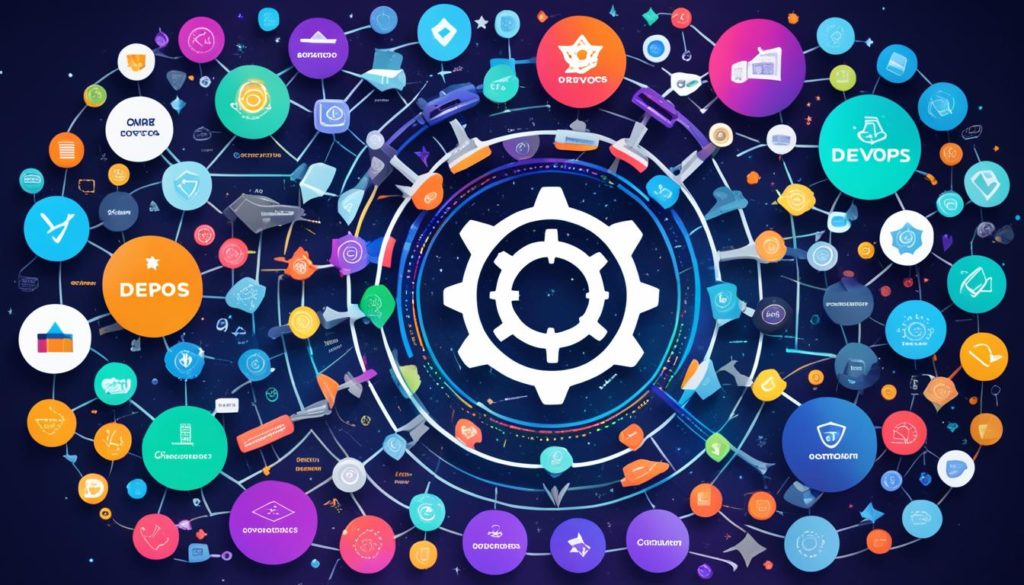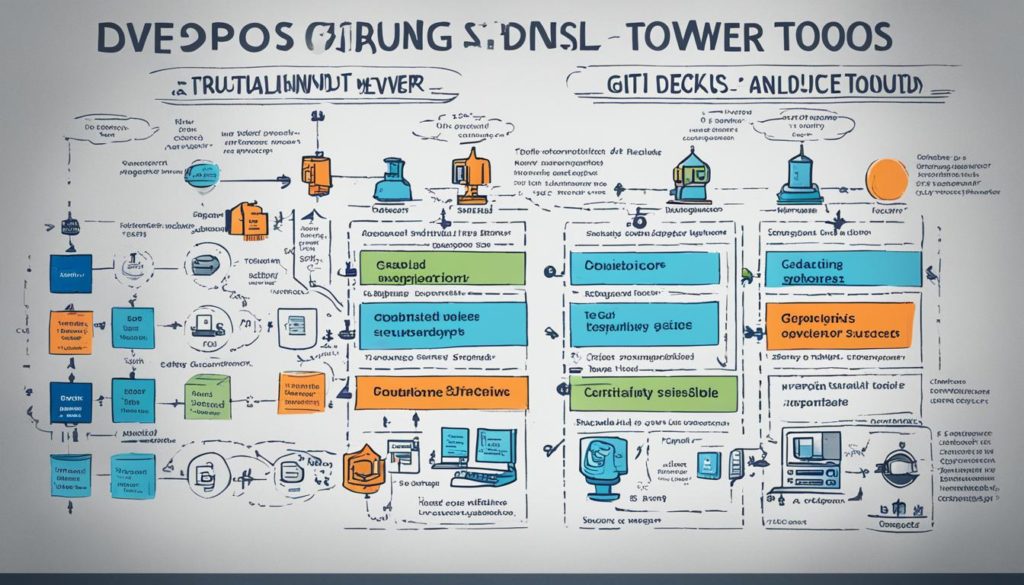
Did you know over 70% of companies have seen teamwork and project speeds boost with DevOps? This fact highlights why it’s key to get the best DevOps tools out there. As 2024 goes on, DevOps is alive with new ideas, showcasing tools like Git (GitLab, GitHub, Bitbucket), Maven, Jenkins, Chef, Puppet, Ansible, Docker, and Kubernetes.
In this fast tech world, development and operations can’t be apart anymore. DevOps brings them together, creating a teamwork-focused, continuous work flow. Using the latest tools helps teams do their jobs better, manage projects smoothly, and deploy software quickly and safely. Now is a great time to compare DevOps tools to find what’s best for you.
Key Takeaways
- The top DevOps tools for 2023 are Git, Maven, Jenkins, Chef, Puppet, Ansible, Docker, and Kubernetes.
- Git is vital for version control, helping with team coding and managing projects.
- Maven helps with managing dependencies and makes builds consistent.
- Jenkins automates building, testing, and deploying software, making CI/CD pipelines more efficient.
- Ansible makes repetitive tasks and setting up infrastructure easier, improving configuration management.
- Docker and Kubernetes improve how applications are managed, scaled, and deployed with containerization and orchestration.
Introduction to DevOps and Its Importance
DevOps blends cultural changes with tech advancements beautifully. It stresses teamwork between development and operations, boosting speed in service and app delivery. Facebook’s mobile app updates every two weeks, showing us how fast and continuously they improve.
DevOps breaks down walls, uniting teams that used to work apart. Through integration and synchronization, development and operations reach new heights in software delivery speed, reliability, and security. Companies like Amazon and Netflix use DevOps to better their user experience, proving its effectiveness.
Jenkins and Docker stand out in DevOps for their roles in Continuous Integration (CI) and Continuous Delivery (CD). They make sure development and deployment go smoothly. Kubernetes helps by managing the deployment, scaling, and management of containerized apps, making workflows smoother.
In the world of DevOps, Terraform is a star for handling infrastructure across different clouds, showcasing its flexibility and scalability. And then there’s Ansible, simplifying the automation of both development and deployment processes.
DevOps encourages developers to own their code from test to production. This approach leads to more frequent system updates, showing off its agility and quick response capability.
Automation is key in DevOps. It reduces operational issues and helps manage complex systems efficiently. Embracing DevOps best practices like Continuous Integration, Microservices, Infrastructure as Code, and Configuration Management pushes towards innovation and operational greatness.
Understanding the importance of DevOps tools is crucial. From Jenkins’ automation flexibility to Kubernetes’ power in container management, these tools are vital. Our thorough DevOps tool reviews will shed light on these important aspects, emphasizing their value in the tech world today.
Version Control: Git (GitLab, GitHub, Bitbucket)
Git is key for managing source code complexity. It tracks project history and supports collaborative work. Platforms like GitLab, GitHub, and Bitbucket are essential in the DevOps tools list.
Why Git Remains Indispensable
Git is crucial because of its strong version control. It keeps a detailed history of code changes. This helps teams track project progress and safely go back to previous versions if needed. Modern development needs this agility and precision.
The Role of Git in Collaborative Coding
Git lets multiple developers work on a project at the same time. It merges changes without hassle. Platforms like GitHub, GitLab, and Bitbucket enable code reviews, issue tracking, and branch features. Git’s role is vital for DevOps.
Managing Code Modifications with Git
Git shines in managing code changes. It tracks who made changes and when. This is crucial for keeping projects on track. All changes are documented and can be undone if needed. Git is thus foundational in DevOps tools.
Continuous Integration and Delivery (CI/CD): Jenkins
Jenkins is a top name in DevOps software. It automates key phases like build, test, and deployments in app development. This makes the journey from idea to product smoother, leading to more productivity and fewer mistakes.
Automating Build, Test, and Deployments
Jenkins shines in automating building, testing, and deploying applications. It’s crucial for teams wanting a strong CI/CD pipeline. Jenkins takes over repetitive work, letting developers craft top-notch code. This shows how good today’s automation tools are.
Jenkins Plugins and Flexibility
Jenkins stands out because of its vast plugin library. This boosts its flexibility. Need a plugin for GitHub, Docker, or Slack? Jenkins likely has it, making it easy to fit into any team’s workflow. This adaptability cements Jenkins as a key DevOps tool.
Jenkins in Modern Application Development
In today’s app development scene, Jenkins is critical. It helps teams use CI/CD pipelines for faster, safer software launches. Jenkins keeps quality high and lowers time-to-market. This makes it an essential automation tool in software creation.
Automation and Configuration Management: Ansible
Ansible is known for its simplicity and strong features in DevOps automation tools. Many organizations choose it for deployment because it doesn’t require agents. Its playbooks are in YAML, making complex management tasks simpler and more efficient.
Last year, 65% of companies using DevOps tools for management saw big improvements. This shows how tools like Ansible boost operational productivity.
Ansible is top-notch for deploying applications, thanks to its agentless setup and wide module library. It differs from tools like Puppet, which handle large setups better because of their language and scalability.
Ansible is free to use and uses a simple language for managing complicated settings. It reduces manual work, improves security, and ensures smooth, mistake-free operations across IT setups. Its important role is also mentioned in resources like DevOps configuration management tools.
| Tool | Best For | Key Features |
|---|---|---|
| Ansible | Application Deployment | Agentless Architecture, YAML Playbooks |
| Puppet | Large-Scale Configurations | Declarative Language, Scalability |
| SaltStack | Event-Driven Configuration | Custom Configurations, Orchestration |
Looking at other DevOps automation tools, Ansible’s ease of use really stands out. Its flexibility makes it key in DevOps, helping us innovate more and worry less about configurations.
Containerization and Orchestration: Docker and Kubernetes
Containerization has changed how we handle and deploy apps in DevOps. Docker and Kubernetes are at the heart of this change. They make managing containers efficient. Docker creates consistent environments for all stages of an app’s life. This makes applications adaptable and scalable.
Streamlining Application Management with Docker
Docker has become essential in DevOps for making app deployment simple. Environments created by Docker are the same everywhere. This means no surprises when moving from development to production. Docker Swarm, its native tool, enables easy load balancing and management. Learn more about Docker’s clustering tools.
Orchestrating Containers with Kubernetes
Kubernetes takes over where Docker leaves off. It’s the top choice for managing containers. Kubernetes automates rollouts, load balancing, and even self-heals. It can scale up to manage heavy traffic. Cloud services like Amazon ECS and Google Kubernetes Engine use it widely. See what’s trending in container tools at current trends.
Docker and Kubernetes are key for DevOps today. They enhance how we develop and deploy applications, meeting business needs. For more on container tools, check out this guide.
FAQ
What are the best DevOps tools in 2023?
Top DevOps tools in 2023 include Git, Jenkins, Ansible, and Docker with Kubernetes. Git handles version control. Jenkins aids in CI/CD. Ansible focuses on automation and configuration. Docker and Kubernetes manage containers.
Why is Git indispensable for DevOps workflows?
Git is key for tracking and managing code changes. It allows for collaborative and decentralized coding. This makes it a cornerstone of DevOps practices.
How does Jenkins streamline the development process?
Jenkins takes over building, testing, and deploying apps automatically. It offers a rich plugin library. Thus, it fits various tools and platforms, easing CI/CD pipelines.
What makes Ansible a powerful tool for DevOps automation?
Ansible simplifies automation with its agentless setup and easy-to-understand language. It cuts complexity, boosting efficiency in diverse environments.
How do Docker and Kubernetes complement each other?
Docker ensures uniform environments for dev, test, and production stages. Kubernetes orchestrates these containers, handling their deployment and operation smoothly.
Why is version control important in DevOps?
Version control is vital for tracking and managing code changes. Git excels at this, ensuring changes are tracked, contributors are accountable, and enabling rollback if necessary.
What role do Jenkins plugins play in development pipelines?
Jenkins plugins boost its capabilities, integrating with various tools and platforms. This customization enhances CI/CD pipelines, making them more efficient.
How does Ansible improve security protocols in DevOps?
Ansible automates tasks, ensuring environments are consistently configured. This reduces human error and ups security across IT setups.
What are the advantages of using containers with Docker in DevOps?
Using Docker containers guarantees consistent software environments. This uniformity lowers discrepancies, enhancing application reliability and scalability.
How does Kubernetes facilitate container orchestration?
Kubernetes efficiently manages, scales, and operates containerized apps. It minimizes manual handling, offering scalable container coordination.
Future App Studios is an award-winning software development & outsourcing company. Our team of experts is ready to craft the solution your company needs.










